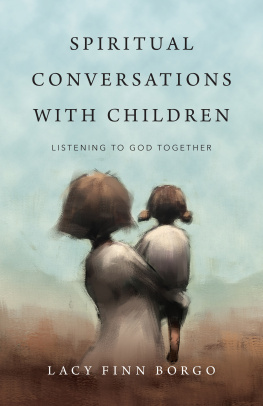Foreword
Roxanne Stone,
Editor in Chief, Barna Group
T he message of Christianity has not always been wielded with grace. Many people know Christianity more for what its against than what it is for. To be against something (or someone) is frowned upon in America today. Tolerance is the word of the dayand while tolerance is certainly a beneficial virtue in a pluralistic society where we must find a way to live alongside one another, walking the fine line between tolerance and ones convictions is a difficult challenge for many Christians.
Indeed in our research, we saw that a fear of giving offense or being rejected is one of the primary barriers for many Christians when it comes to talking about their faith. The number-one reason people told us they dont have more spiritual conversations is because religious conversations always seem to create tension or arguments. Christians told us that when it comes to their faith in society today, they feel misunderstood (65%), persecuted (60%), marginalized (48%), silenced (46%), and afraid to speak up (47%). When nearly half of practicing Christians feel afraid to speak up about their faith, it is no wonder fewer and fewer are doing so.
Because youve picked up this book, Im going to go ahead and assume youre actually interested in talking about God. But, perhaps like me, youve noticed that doing so has become more and more difficult. The words once shared by common belief seem almost foreign nowgrace, justice, charity, sin, forgiveness, holinessyou cant speak them without needing to define them. (Which maybe isnt such a bad thing, really? Maybe being forced to give some real thought to these profound concepts is a worthy challenge.)
In the pages of this book, through Dons clear prose and compelling stories, I hope youll find the encouragement and inspiration you need to wade into the tricky tides of spiritual conversations. And I pray the real-life data from Barna will help you recognize the issues making those conversations difficult, so you can engage with knowledge and respond with empathy.
The spiritual conversations Ive had over the years have not always been funthey havent always led to spiritual awakening. But like the eager conversationalists youll meet in this book, I came to find them rewarding and always, always worth the effort.
Let the conversation begin.
Introduction
Are My Feet Beautiful?
S everal years ago I was sitting in the window seat of a Greyhound bus heading from the desert town of Ontario, Oregon, to the rainy town of Tacoma, Washington. This 500-mile route normally takes about eight hours to drive, which translates to about a fifteen-hour bus ride. It turns out buses do unusual things like obeying the speed limit and stopping in every single little town on the way. Or so it seems.
In the seat next to me was a woman in her early thirties who, for 13 hours, I didnt say a single word to or even acknowledge. For 13 hours! There were several stops along the way (remember, every single little town ) where one or both of us would get off the bus to buy food or use the facilities. Then wed get back on the bus, sit in our a-little-bit-too-close-for-comfort seats on the left side of the bus, and continue to not talk.
Why the conspicuous lack of conversation? I suppose part of this is normal. Have you ever noticed theres a special set of social rules when we are on planes, trains, and busesa sort of public transportation Cone of Noninteraction? When we are sitting next to someone on a crowded plane or bus or light rail, it is completely acceptable to not interact. Even though we are sitting uncomfortably close for long periods of time, even though our shoulders and elbows may actually touch from time to time, it is acceptable to not engage in any sort of conversation while in the Cone of Noninteraction.
But if Im being honest, there was more than that going on during our silent bus ride. I may have been silent, but as the bus ride stretched on there was a sort of escalating war going on inside of me. You see as a Christian I know I am sent by Jesus to be a messenger of his to the people around me. I knew this that day as I sat on the bus too. In fact, I was an intern with InterVarsity Christian Fellowship, basically a campus pastor in training. So I knew clearly that Jesus was in the business of rescuing people and that I had been enlisted in that mission.
As a campus ministry intern I was quite familiar with Pauls simple logic in that Romans 10 passage at the beginning of this introduction:
Anyone who calls on the name of the Lord will be saved.
But how will they call on someone they dont believe in?
And how will they believe in someone theyve never heard about?
And how will they hear unless someone tells them about him?
I knew all that. In fact (this is where the story gets a little embarrassing) for the first 13 hours of the trip I was reading a book. It happened to be a book aboutevangelism. Yes, I was enjoying Becky Manley Pipperts call to relational evangelism, Out of the Saltshaker and into the World , while completely ignoring the human being seated two inches from my right elbow and shoulder.
And at first the irony was lost on me. (Did I mention this is an embarrassing story?) I had been asked to read the book by an older Christian, and so I was. I found it to be well-written and captivating, though I have to admit I felt there wasnt much new about the content. I already knew that followers of Jesus were called to witness to and share with others about Jesus. (I even taught this as a campus intern.) I was just, to put it simply, not planning on doing that. Ever.
To say I was a reluctant conversationalist would be an understatement. I was not interested in striking up even a pedestrian, everyday conversation with the woman seated next to me. To use Pipperts language, I knew I was the salt of the earth, but I had little interest in leaving the saltshaker.
Why? I guess I felt I was called to the college campus and that contact evangelism (being open to spiritual conversations with people youve just met) just wasnt my thing. But also, I suppose, it really was a combination of apathy, shyness, and basic fear. And some simple logic: I assumed spiritual conversations were pesky, painful, awkward things, and I make it a habit to avoid pesky, painful, awkward things. Therefore, logically, 13 hours of silence.










